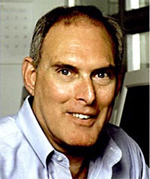 |
Karin, SidneyProfessor Emeritus, Computer Science and Engineering |
|
Bio: Sid Karin joined the UCSD faculty as an adjunct professor in 1986. He received his Ph.D. in nuclear engineering from the University of Michigan in 1973. Karin worked for General Atomics from 1973-85, ultimately as director of its Information Systems Division. He was the founding director of the San Diego Supercomputer Center from 1985-95, and then from 1997 to 2001. Karin is a Fellow of the American Association for the Advancement of Science, and a member of ACM and the IEEE Computer Society. He was a member of President Clinton's Information Technology Advisory Committee's (PITAC) Panel on Transforming the Practice of Healthcare in 2000, and sits on advisory boards at Telcordia Technologies and Applied Metacomputing. Karin has been awarded the Atomic Energy Commission Special Fellowship in Nuclear Science and Engineering, the National Defense Education Act Fellowship, and the New York State Regent College Scholarship. Karin is co-author, with Norris Parker Smith, of 'The Supercomputer Era' (Harcourt Brace Jovanovich, 1987).
|
|
